Private Internet Access (PIA) is one of the most affordable premium VPNs to keep your data protected. Still, with such a low price, I wondered whether PIA could really stand out against its higher-priced competitors. So, my team and I set off to investigate.
Is Private Internet Access safe? The VPN has a reputation of being safe and trustworthy, and that’s more important than ever because it’s estimated that over 1.75 billion people use VPNs worldwide (DemandSage, 2025)1. This means there’s tons of competition, and a VPN is worthless if it can’t keep your data secure. PIA has some of the most advanced and customizable security features, despite its price.
After extensive testing, I highly recommend Private Internet Access, especially for advanced VPN enthusiasts. On top of its high-level security, it excels in nearly every other area. It’s fast on nearby servers, great for streaming, and it comes with one of the largest server networks. There are only a few minor drawbacks that keep it from being our top recommendation.
Try PIA Risk-Free >>
Private Internet Access Pros, Cons, and Needed Improvements
Private Internet Access Features — 2026 Update
9.5
|
💸
Price
|
2.19 USD/month
|
|
📆
Money Back Guarantee
|
30 Days |
|
📝
Does VPN keep logs?
|
No |
|
🖥
Number of servers
|
29650+ |
|
🛡
Kill switch
|
Yes |
|
🗺
Based in country
|
United States |
|
🛠
Support
|
24/7 Live Chat Support |
|
📥
Supports torrenting
|
Yes |
Streaming — Great Compatibility and Excellent Quality
9.8
Private Internet Access can safely access all the top platforms from anywhere, and the streams look great. My international team and I achieved great success with PIA's streaming-optimized servers, but many regular servers also perform well. We hardly had to do any troubleshooting either. Even though PIA is known as a VPN with tons of advanced customization features, we could get smooth streams without touching the settings.
Be advised. Private Internet Access adheres to a strict no-logs policy that prevents it from keeping track of (or even seeing) what you do online. This means it’s your responsibility to use the VPN according to the rules and regulations of your country and the streaming service you’re using. My colleagues and I do not condone copyright infringement.
Popular Streaming Platforms We Tested
| Streaming Service |
Status |
| Netflix |
✅ |
| Hulu |
✅ |
| Disney+ |
✅ |
| BBC iPlayer |
✅ |
| Amazon Prime Video |
✅ |
| HBO Max |
✅ |
| Paramount+ |
✅ |
We could stream Netflix UK, Canada, US, Japan, Germany, Sweden, Denmark, and more. Tests were conducted with multiple browsers, and each one worked great. Netflix worked right away in all our tests, so there was no need to reach out to support, although I appreciate how easy they are to get a hold of (more on that later)
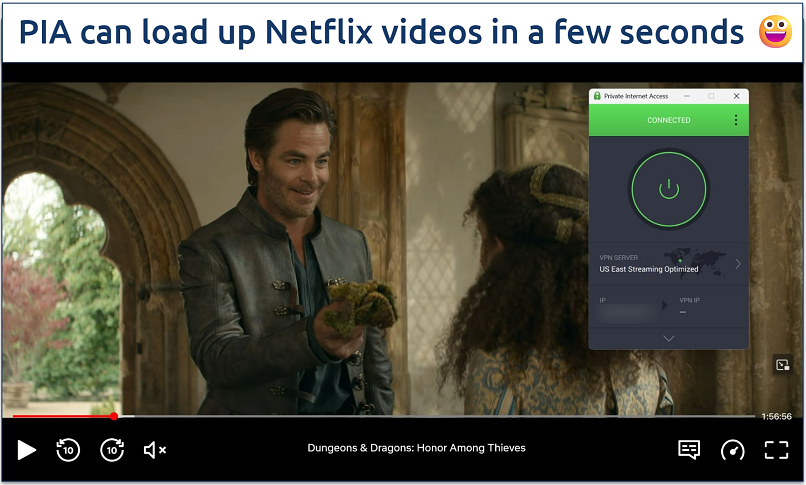 We could watch Dungeons & Dragons without any pauses for buffering
We could watch Dungeons & Dragons without any pauses for buffering
We found that using OpenVPN with the 128-bit encryption level allows videos to load even faster. For maximum security, you’ll want to keep the encryption up at 256 bits, but half of that is still nearly unbreakable. It can come in handy if you have slower base speeds.
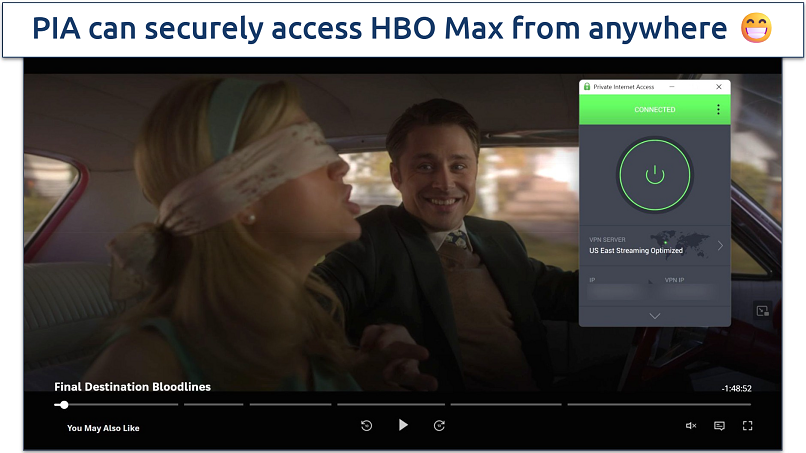 We could skip forward in the video without waiting for it to load
We could skip forward in the video without waiting for it to load
PIA remains one of the best VPNs for secure streaming. The only slight improvement I can see them making is including some information about server load. This data is usually represented as a percentage, indicating how crowded a location is. The VPN's extensive network makes it easier to find the fastest server for streaming in a given region. Otherwise, it’s practically perfect in this category.
82% Off
Pay less when purchasing ExpressVPN today!
Money-Back Guarantee: 30 Days
Considerable savings can be made with this offer!
Speed — Great on Nearby Servers, but Slower At Long Distances
9.0
Overall, PIA offers impressive speeds, especially on nearby servers. Our dedicated speed tester got some speed loss at long-distance servers but reported it wasn’t enough to disrupt their browsing and streaming experience.
When testing PIA’s speeds, we look at 3 different things:
- Download speed is how fast you receive data from the server you’re connected to. It impacts activities like streaming and web page loading, and it’s measured in Mbps (megabits per second).
- Upload speed is the rate at which data is sent from your device. It affects how fast you can send files, post on social media, upload videos, etc. It’s also measured in megabits per second.
- Ping is the time it takes for data to travel between the game server and your device. If the ping is too high, you will have noticeable latency in your gaming session. Ping is measured in milliseconds (ms).
Our dedicated speed expert regularly measures speeds for PIA and other top VPNs from the same US location. In the table below, you’ll see average rates gathered from several tests with each server. Every result was recorded with the same internet connection to create fair comparisons.
 USA (Dallas)
USA (Dallas)
Download Speed
Upload Speed
Ping
 USA (Miami)
USA (Miami)
Download Speed
Upload Speed
Ping
 USA (Los Angeles)
USA (Los Angeles)
Download Speed
Upload Speed
Ping
 USA (New York)
USA (New York)
Download Speed
Upload Speed
Ping
 Canada
Canada
Download Speed
Upload Speed
Ping
 Brazil
Brazil
Download Speed
Upload Speed
Ping
 UK
UK
Download Speed
Upload Speed
Ping
 France
France
Download Speed
Upload Speed
Ping
 Japan
Japan
Download Speed
Upload Speed
Ping
 Australia
Australia
Download Speed
Upload Speed
Ping
 Singapore
Singapore
Download Speed
Upload Speed
Ping
234.37 Mbps
183.14 Mbps
4 ms
147.88 Mbps
171.73 Mbps
12 ms
129.56 Mbps
132.36 Mbps
46 ms
152.41 Mbps
112.51 Mbps
47 ms
5.51 Mbps
7.42 Mbps
68 ms
183.28 Mbps
17.64 Mbps
140 ms
67.86 Mbps
96.83 Mbps
120 ms
6.61 Mbps
17.78 Mbps
122 ms
203.32 Mbps
13.17 Mbps
142 ms
59.36 Mbps
13.25 Mbps
191 ms
60.81 Mbps
5.33 Mbps
210 ms
203.60 Mbps
46.40 Mbps
5 ms
150.32 Mbps
55.06 Mbps
8 ms
166.89 Mbps
111.88 Mbps
53 ms
169.57 Mbps
66.42 Mbps
42 ms
175.09 Mbps
46.30 Mbps
45 ms
158 Mbps
80.81 Mbps
50 ms
139.03 Mbps
68.73 Mbps
228 ms
133.12 Mbps
89.52 Mbps
115 ms
158.51 Mbps
62.77 Mbps
118 ms
134.14 Mbps
42.65 Mbps
152 ms
142 Mbps
115.86 Mbps
173 ms
150.43 Mbps
85.31 Mbps
211 ms
218.73 Mbps
50.42 Mbps
6 ms
169.58 Mbps
83.50 Mbps
9 ms
143.62 Mbps
77.82 Mbps
54 ms
161.10 Mbps
103.06 Mbps
42 ms
8.23 Mbps
8.39 Mbps
64 ms
186.87 Mbps
63.28 Mbps
150 ms
70.57 Mbps
102.14 Mbps
114 ms
111.83 Mbps
95.40 Mbps
120 ms
87.54 Mbps
11.23 Mbps
193 ms
128.44 Mbps
10.25 Mbps
208 ms
These tests are conducted from the USA
*N/A indicates that we do not currently have speed test data for this location
Overall, these are excellent results you’d expect from a premium VPN like PIA. While there can be specific servers that drop a little more than expected, the vast majority keep our speeds above 100Mbps. This is more than enough for just about any activity, and it served us well while streaming. It was also excellent for gaming, as you’ll see below.
Gaming — Smooth Gameplay With Low Ping Rates
9.0
We had no problem staying competitive playing online games while connected to Private Internet Access. You need to monitor your ping rates to avoid lag when playing games. It’s best if they stay below 85ms. Thankfully, PIA gave us rates far below this on nearby servers.
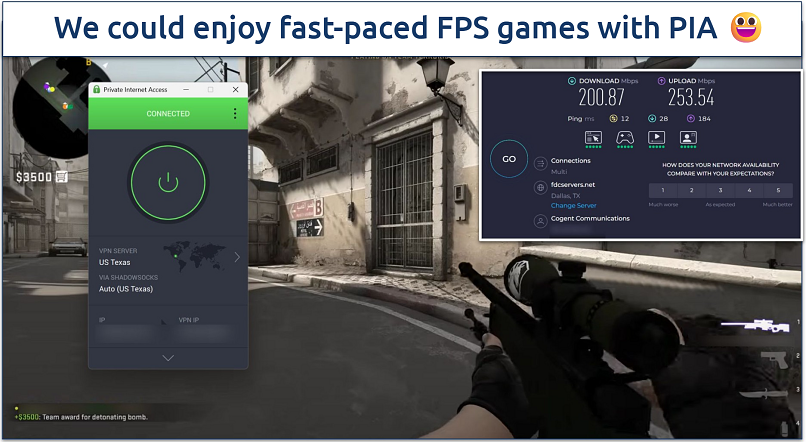 We could run, shoot, and jump without added delays
We could run, shoot, and jump without added delays
It may be difficult to play games with distant servers, but that’s true with all VPNs. Distance almost always lowers speeds, and these drops are most severe when it comes to ping. Luckily, PIA has a massive network, so you’ll likely be able to find a server that’s pretty close. I also love that it displays ping rates next to each server, allowing you to check them out before connecting. They’re usually pretty close to our speed results, so they’re a reliable measure of speed.
Server Network — A Large Network With Great Coverage
9.8
PIA has one of the largest server networks of any VPN. It currently offers over 29,650 servers in 90 worldwide — more than any other VPN I’ve tested. It also uses dedicated 10 Gbps internet lines to offer increased bandwidth.
That said, PIA’s coverage is not as widely dispersed as some other VPNs. For example, ExpressVPN and CyberGhost both have fewer servers in total, but they cover more countries than PIA.
Is PIA good for the US? The VPN has servers in every US state, which could be particularly useful since some people estimate that 46% of Americans use VPNs (Exploding Topics, 2024)2. Other sources believe that it’s closer to 42% of Americans who make use of VPNs (Analyzify, 2025)3. Either way, it’s one of the few VPNs to cover the US this extensively, making it a great choice if you live in a less populated area of America and want a nearby location.
PIA has virtual servers in around 80 locations. These servers give you an IP from the country they’re intended for, but they’re not physically located there. It has 150 locations total, so virtual locations make up over 50% of PIA’s server network. That’s not a problem for me since I don’t mind using these servers. However, there are VPNs that don’t use any if this concerns you.
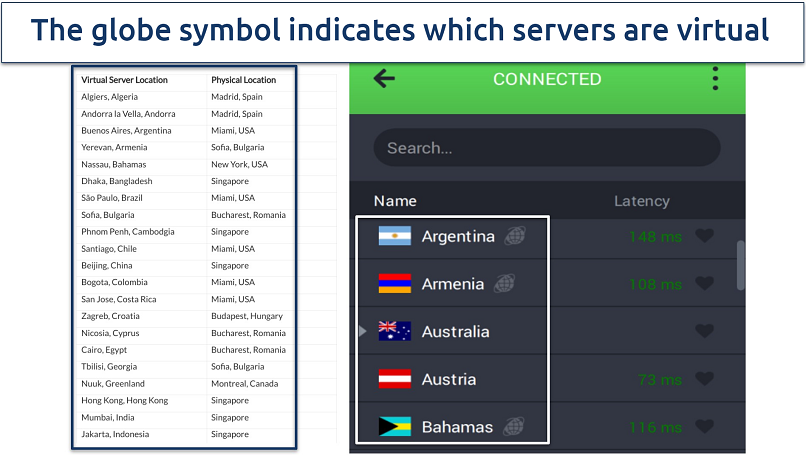 PIA has a list on its websites with all its virtual servers and where the physical server is located
PIA has a list on its websites with all its virtual servers and where the physical server is located
PIA owns all of its servers, so you don’t have to worry about a third party handling your data. Most VPNs use outside companies to handle at least a few of their servers, and some only use rented servers. This shows that PIA is dedicated to protecting your data.
For a small extra fee, you can get a dedicated or static IP address, which means you can use the same IP address every time you log into the VPN. Dedicated IP addresses are used only by you, so they are much less likely to be detected and blocked by streaming platforms and other sites.
For added privacy, PIA’s entire network runs entirely on RAM (volatile memory). RAM-only servers are much more secure than traditional HDD-based servers, as your private data is automatically wiped from the server with each reboot.
It also uses NextGen, colocated servers, meaning that it owns and operates its own private DNS servers. This means your DNS requests are handled privately by PIA, unlike standard DNS servers provided by ISPs. It enhances your internet privacy as your internet activities won’t get into the hands of unwanted third parties.
Does Private Internet Access Work in China? Maybe, but It’s Not Guaranteed
PIA claims that it’s possible to use it in China, but you need to download the app to your device before you get there. Customer support also confirmed that it’s not always guaranteed to work in China and may require some troubleshooting. This isn’t surprising, though, as even the best VPNs for China don’t record 100% of uptime.
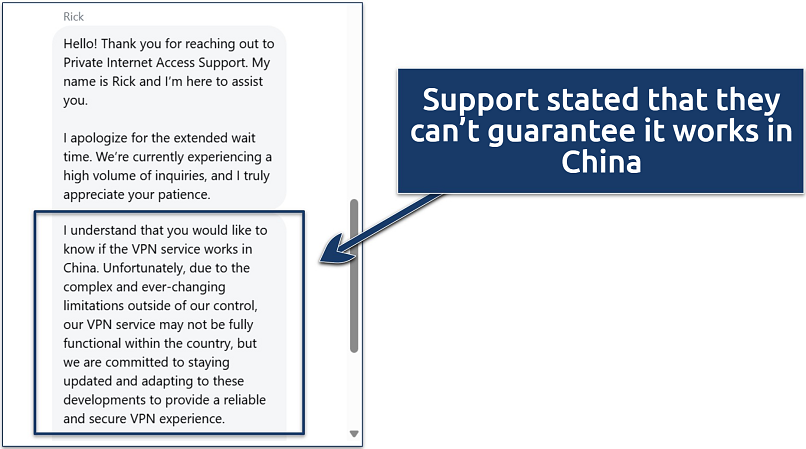 WireGuard is the best choice for connecting in the country
WireGuard is the best choice for connecting in the country
It’s also one of the few VPNs to offer servers in China. These are virtual, so they provide you with a Chinese IP address but aren’t physically located there to ensure a private connection. The downside is that these connections increased my ping to 278 ms and reduced my speeds by almost 80%.
The Chinese government only allows government-approved VPNs and enforces this by blocking VPN services in the country. However, there are no publicly reported cases of China going after tourists for using them. Nevertheless, we urge you to make yourself aware of the current laws and regulations about VPN use in China and the risks that might come with it.
Security — Good, With Several Customization Options
9.8
Private Internet Access has all the standard security features of a premium VPN. This includes military-grade encryption, a reliable kill switch, split tunneling, multihop, and several security protocols to choose from.
It’s unique in that it lets you choose your encryption level, a feature you will not find in most VPNs. Plus, its apps are fully open-source, which means anyone can check the code for security vulnerabilities. With PIA, you also get full protection against DNS and WebRTC leaks.
Solid Encryption
Private Internet Access offers military-grade 256-bit encryption to prevent anyone from spying on your data. With the OpenVPN protocol, the default setting is 128-bit encryption, but I recommend moving it up to 256-bit if you need added protection. It can slow down your speeds slightly, but it’s worth it for the extra security. If you’re using WireGuard, the encryption level is always 256-bit.
You can no longer change the handshake settings or choose between a few data authentication options. Private Internet Access removed this customization option to fix compatibility issues and make the VPN more stable.
Now, the VPN defaults to the most secure settings (GCM ciphers and the RSA-4096 certificate), so you’ll still get top-notch security. The same level is used for both protocols. It also offers 4 remote ports for both TCP (8443, 853, 443, 80) and UDP (8080, 853, 123, 53), or you can enter a local port in the PIA client.
IP/DNS Leak Protection and Kill Switch
PIA offers full protection against DNS, WebRTC, and IP leaks. It kept our real IP addresses hidden during extensive testing.
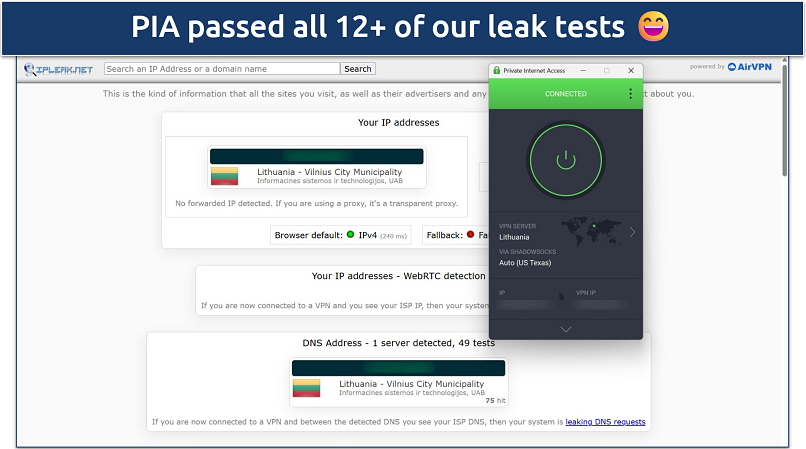 It was successful during tests with all its protocols and encryption levels
It was successful during tests with all its protocols and encryption levels
PIA's kill switch blocks your internet traffic if the VPN gets disconnected. This feature is essential because it reduces the risk of hackers stealing your data, as your real IP address cannot be accidentally leaked.
The kill switch feature is available on Windows, Mac, Linux, Android, and iOS devices.
Security Protocols — 3 Good Options
PIA uses OpenVPN and WireGuard — two of the most secure protocols available. They are available on all its desktop apps (Windows, Mac, and Linux) and Android. For iOS devices, it also offers IPSec (IKEv2). This is a good selection of protocols, but unlike some services, like ExpressVPN and NordVPN, PIA doesn’t have its own proprietary VPN protocol.
MACE Ad Blocker — Effective At Blocking Malicious Ads, But Not Paid Ads
PIA comes with a powerful ad blocker called MACE that serves primarily to block malicious ads. To get more info on PIA’s ad blocker, I contacted a support agent, who confirmed that MACE doesn’t block all ads — only those that contain malicious content.
To test it, I visited the ad-heavy websites Forbes and Daily Mail, and only 1 ad got through on each site, which is a big improvement.
Additional Security: Identity Guard and Antivirus
PIA also has a feature that shows you if your email address has been exposed in a data breach. You can access this through the Client Support Panel under the tab Identity Guard. It will regularly search for your email address, and you can set up email alerts to notify you if it’s ever compromised.
There’s an Antivirus add-on for a small extra fee. It is designed to remove malware without user tracking or logging, emphasizing full control over data and digital privacy. It can be added to your purchase for $5, and it can be accessed using the same credentials as your VPN account. Editor's Note: Private Internet Access and this site are in the same ownership group.
Privacy — A Proven No-Logs Policy, but It's Located in the US
9.6
Overall, PIA is a good option for privacy due to its strict no-logs policy and the features it offers. However, it's based in the US, which is not so privacy-friendly. Still, you can be assured that even if your data were requested by government agencies, there would be nothing to show. This has been proven on numerous occasions.
Does Private Internet Access Keep Logs? No
Private Internet Access ensures that no identifiable information about you is stored. The only details it keeps are your email address, payment information, state, and zip code (for taxation reasons), and anonymized data that aids in service improvement. For heightened security, it allows you to make payments using cryptocurrency.
Its privacy policy has been verified in court. In 2016, the FBI requested information about a user, and PIA couldn’t provide any data on their activities because nothing was stored. The Russian government also seized PIA servers in 2016, but didn’t find any identifiable data. After this, PIA took down all of its Russian VPN servers.
In 2018, its policy was proven once again when the US government asked PIA to hand over identifiable information about a user, and it had nothing to share.
Was PIA VPN Audited? Yes
In June 2022, PIA's no-logs policy was independently audited by the Big Four auditing firm Deloitte. It found that PIA's server configurations are in line with its internal privacy policies, don't store logs, and cannot identify users or track their activities. This means there is no record of your online activity on PIA's servers.
Based in the US
Private Internet Access operates out of the United States, which isn’t the most privacy-friendly country. The US was one of the founding members of the 5/9/14 Eyes Alliance. This is a pact between governments where they promise to share information on people they’re suspicious of.
Nevertheless, Private Internet Access adheres to a robust no-logs policy that has been frequently audited and verified. Having operated for more than ten years without storing or sharing any identifiable user information, it has earned my trust regarding data protection.
PIA is also owned by Kape Technologies, which was formerly known as Crossrider and operated in the mobile advertisement and browser extension development sectors. In 2018, the company faced criticism when hackers exploited its software to include adware in some of its downloads.
However, since the name change, the company has shifted its focus from advertising to VPNs. Kape also owns CyberGhost and ExpressVPN, 2 other trustworthy VPNs. Plus, I ran tests on the app, and it was completely free of malware.
Regardless of its ownership, Private Internet Access has been a trusted VPN for over 10 years. It supports non-profit organizations like the Electronic Frontier Foundation and Creative Commons, which are dedicated to internet freedom. Most importantly, Private Internet Access’s privacy policy has been proven in court, so I trust it to be responsible with my data.
Torrenting — Download on Any Server With Fast Speeds
9.6
PIA allows P2P file sharing across all its servers. I found this really convenient as there is no need to look for specialized P2P servers to download torrent files.
I generally download a 700MB file in about 10 minutes with no VPN connected. However, when I connected to a nearby server, I could complete my torrent faster with PIA. It only took around 7 minutes, which impressed me because there were hardly any seeders online.
You can also increase your speeds by turning on PIA’s port forwarding feature. This will increase the number of seeders and allow you to download torrent files even faster. I didn’t like that port forwarding is not available on US servers, though. After asking a support agent about this, I was only told that it was due to legal reasons.
There is also the option to use a SOCKS5 proxy, but I don’t recommend it for torrenting. PIA’s proxies work as a double-hop, meaning your connection is sent to the proxy and then the VPN tunnel. This slows speeds quite a bit.
Overall, I was impressed with PIA’s torrenting abilities. It not only offers fast speeds for torrenting but also has military-grade encryption, a strict no-logs policy, and strong leak protection. This will allow you to torrent safely without worrying about your activity and personal data being exposed.
My team and I do not condone any illegal activities. Downloading copyrighted files is not allowed in most countries, so you should always check your country’s local laws and regulations before torrenting with PIA.














